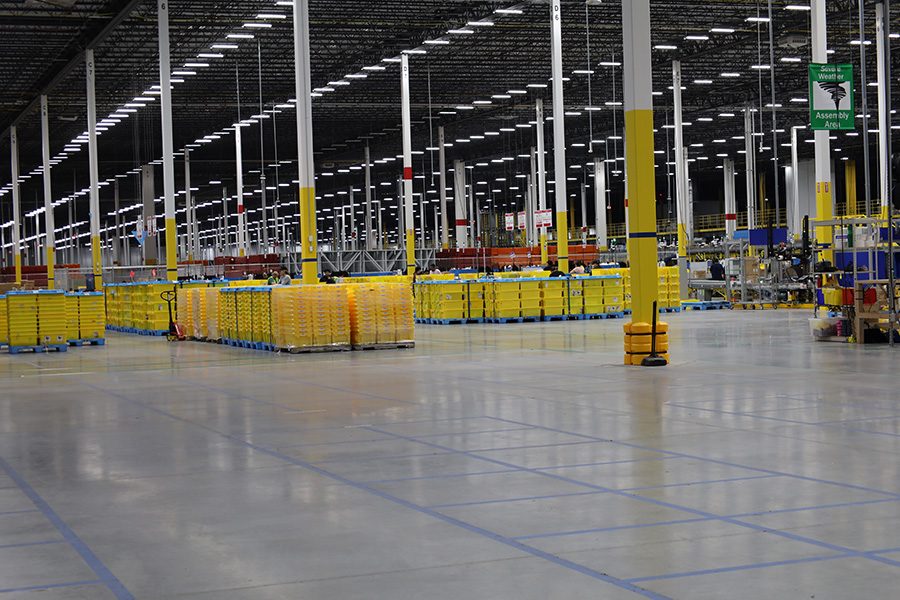
Amazon’s Pasco warehouse isn't the only thing tying the global company to the Tri-Cities. The online retail giant is also partnering with Energy Northwest on four advanced small modular reactors as the region's energy industry continues to boom.
Photo by Rachel VisickTri-Cities is still where companies want to be
Kirt Shaffer said he expected to see some movement in the commercial real estate market after the November general election. However, the commercial Realtor knew a number of clients he worked with had planned to hold off on any developments for at least a year or two given interest rates, inflation and other factors.
Now, though, many of those same clients are wanting to start those paused projects as soon as they can in 2025.
“It’s almost like a light switch went off in the last couple weeks,” said Shaffer of Pasco’s Tippett Company.
It’s another sign that the economic development that’s been synonymous with the Tri-Cities in recent years is primed to continue, experts and officials say.
Energy-related ventures continue to set up shop in the region while long-established industries such as agriculture continue to hold their own. Meanwhile, light industrial spaces are being leased out to companies from around the state wanting in on Tri-Cities' growing market or expanding to meet demand.
“We’re still very bullish on next year,” said Karl Dye, president and CEO of Tri-City Development Council (TRIDEC).
Energy leads the way
The energy sector saw big developments in the final months of 2024.
- Retail giant Amazon is partnering with Energy Northwest on a project that aims to bring four advanced small modular reactors able to generate 320 megawatts to land near the Columbia Generating Station by the Hanford site.
- A $6.2 million expansion at Tidewater’s Snake River Terminal in Pasco has given the terminal the capacity to blend more than 2 million gallons of biodiesel per month.
- While it’s being challenged by opponents, the planned Horse Heaven Clean Energy Complex off Interstate 82 between Benton City and Prosser would generate about 1,150 megawatts through its wind farm. Scout Energy has said the project will generate an expected 1,000 jobs during construction.
Research and development in energy also is ramping up.
- Startup Avalanche Energy of Seattle is planning to expand to space at the Port of Benton. Avalanche is working to research and develop a 1-100kWe compact fusion machine called “Orbitron, which is small enough to sit on your desk,” according to Avalanche’s website.
- Pacific Northwest National Laboratory’s Grid Storage Launchpad facility opened this past summer. It is home to all of PNNL’s energy storage researchers, from those developing new battery chemistries to those testing next-generation technologies under real-world conditions.
- AtkinsRéalis opened its new Technology Center in Richland in April. The $20 million facility will be used to further development and application of innovative nuclear and environmental cleanup technologies, engineering Net Zero and hydrogen clean energy advancements, digital solutions and robotics implementation.
- Two Tri-City companies were the recipients of hundreds of thousands of dollars in grants from the state for the development and demonstration of a plug-and-play low-head turbine to make low-head/low-flow hydropower facilities adaptable to energy production and to conduct a feasibility study to use woody biomass for biogasification and a carbon sequestration project.
“It feels like we’re going to continue to be the place for clean energy projects,” Dye said.
And all those energy projects are going to be needed, Dye said.
Power availability is a growing concern in the Mid-Columbia, especially as more projects with significant energy requirements look to locate in the region. Those include Atlas Agro’s proposed Pacific Green Fertilizer plant in Richland and data centers such as the $5 billion facility proposed by a multinational technology company that’s signed a letter of intent with the Port of Walla Walla for property in Wallula.
“Everything we read about AI coming online, the amount of storage and power that will be needed is incredible,” Dye said.
In-demand properties
The need for space is also making the commercial real estate market hot, Shaffer said. Construction or construction-adjacent companies want to open locations in the Tri-Cities after seeing so much of their clientele come from the area. Others may already be here but need to expand to meet demand.
While acknowledging that interest rates are a consideration, the need for light industrial space makes it worth the investment.
“A lot of the landlords I deal with have enough cash on hand that financing is minimal,” he said. “And the rent rates for these types of products are breaking all kinds of highs.”
There are parts of the local economy that are struggling or ways the Tri-Cities can better position itself to keep growing, experts said. Retail spaces have seen declining demand, Shaffer said, and he expects leases for office space to shrink as more employers reassess the need for it as more people work remotely.
Dye said continuing to create community amenities that improve quality of life is important to keep attracting employers. Having diverse entertainment, retail and recreation options is what will draw the talented workers those employers need.
Nevertheless, Shaffer said there’s a lot of optimism in the business community following the November election.
Dye said President Donald Trump’s first term in office did not significantly affect the federal funding that flows into the Hanford site and PNNL so they can remain as bases for economic activity.
“We’re excited for the new year,” he said.
